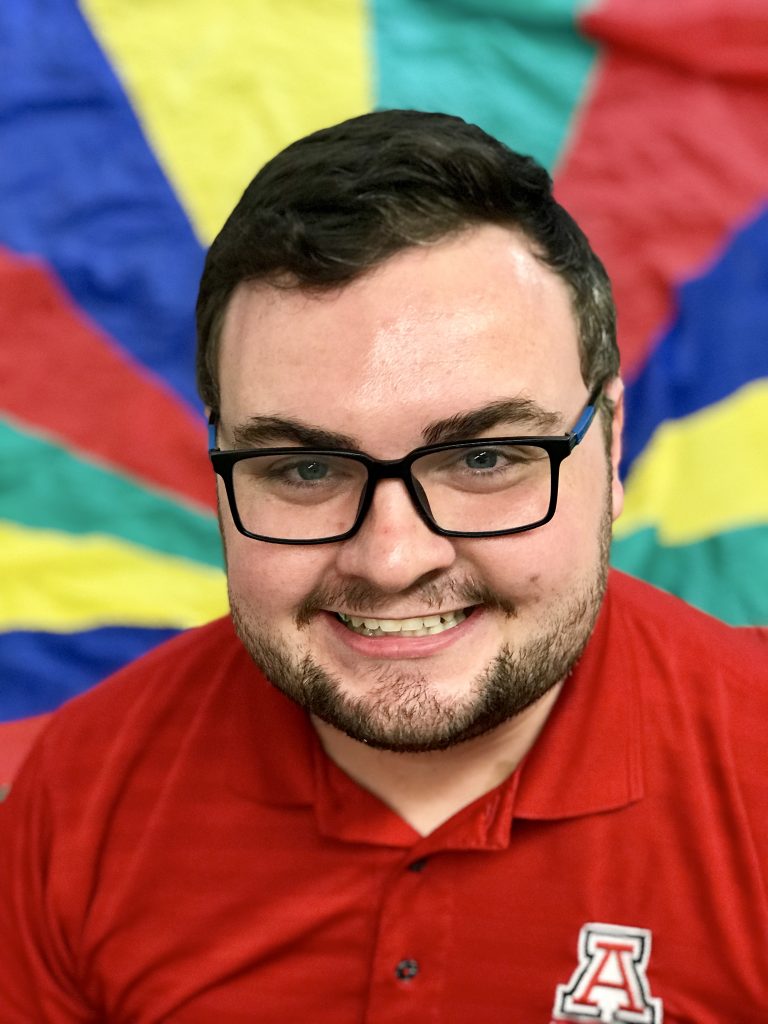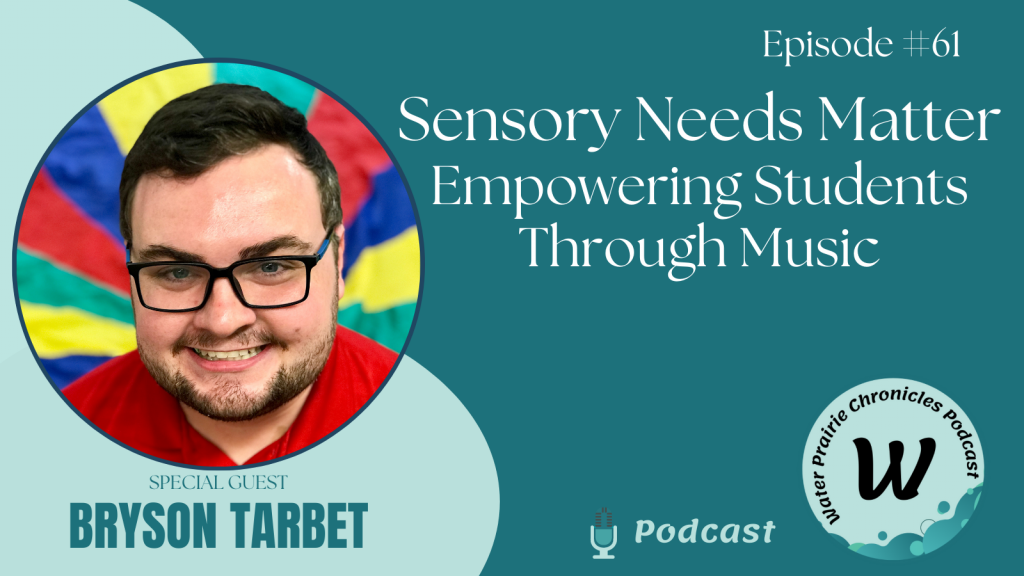Episode #61: Sensory Needs Matter: Empowering Students Through Music
Show Notes: Discover how an elementary school music teacher from Ohio is revolutionizing education by creating sensory and emotionally inclusive classrooms. Through his personal experiences with ADHD and sensory processing disorder, Bryson Tarbet advocates for removing barriers and empowering students to embrace their unique selves. Join us on this episode of the Water Prairie Chronicles as Bryson shares his insights and strategies for incorporating music education to help students with ADHD and SPD develop self-regulation skills that extend beyond the classroom. In Episode 61 of the Water Prairie Chronicles, Tonya Wollum interviews Bryson Tarbet, an elementary school music teacher from Columbus, Ohio, who is an advocate for creating sensory and emotionally inclusive classrooms. Bryson shares his personal experiences of being diagnosed with ADHD as a child and sensory processing disorder (SPD) in recent years. He embraces his unique way of processing the world and uses his experiences to shape his teaching methods. In the Two Truths and a Lie game, Bryson reveals three facts about himself: he has been in multiple professional operas, a deer once jumped through his classroom window, and he aspired to be a paramedic when he was younger. Listeners are invited to guess which fact is a lie by posting in the comments. The conversation then focuses on ADHD and SPD, with Bryson explaining that both are neurological disorders affecting how individuals process the world. He shares how ADHD manifests for him, often resulting in hyper-fixation and forgetfulness. In contrast, his sensory processing disorder is characterized by sound sensitivities, which can lead to overstimulation and mood changes. Bryson embraces these challenges and aims to create a classroom where students can feel comfortable being themselves without conforming to neurotypical standards. Tonya asks Bryson about the importance of creating sensory-friendly classrooms. He explains that sensory needs are fundamental and meeting those needs helps prevent disruptive behaviors and promotes safety. Bryson emphasizes the significance of removing barriers and providing opportunities for students to regulate their sensory experiences, ensuring they do not feel punished for things beyond their control. Regarding music education, Bryson highlights how it can help students with ADHD and SPD develop self-regulation skills. As someone who found solace in music, he believes it offers validation and allows hyper-fixations to be channeled into something the world values. Bryson mentions that music education teaches collaboration, teamwork, and understanding individual contributions. He appreciates the flexibility music provides for movement, allowing students to learn in ways that suit their needs. Tonya and Bryson discuss how music education extends beyond the classroom. Music helps students understand their emotions and how different music can regulate them. By fostering introspection and reflection, music education equips students with tools applicable to various aspects of their lives. Challenges associated with teaching music in a sensory-friendly manner are also addressed. The music classroom presents distractions such as instruments, bright lights, and sound triggers. Bryson shares strategies he has implemented, including fidget tools and headphones for tactile feedback and sound dampening. These accommodations are available to all students, not just those with sensory needs, to promote inclusivity. In conclusion, Bryson's interview sheds light on the importance of creating inclusive classrooms that address the sensory and emotional needs of students. He demonstrates how music education can be a powerful tool for self-regulation and empowerment, allowing students to thrive beyond the classroom. Connect with Bryson: Instagram: @ThatMusicTeacher (https://www.instagram.com/thatmusicteacher) Website: https://www.thatmusicteacher.com/ Podcast: That Music Podcast (https://podcasts.apple.com/us/podcast/that-music-podcast/id1489497622) Connect with Us: https://linktr.ee/waterprairie Support this channel: https://www.buymeacoffee.com/waterprairie Music Used: “LazyDay” by Audionautix is licensed under a Creative Commons Attribution 4.0 license. https://creativecommons.org/licenses/by/4.0/ Artist: http://audionautix.com/ Meet Today's Guest: Bryson Tarbet is a PreK-6th grade general music teacher just outside of Columbus, Ohio. He received his Bachelor’s of Music in Music Education from Ohio Wesleyan University his Master of Music in Music Education with a Kodály emphasis from Capital University. Bryson spent his first year out of college as part of an elementary school intervention team and he fell in love with working with students with disabilities. Due to this experience, as well as his personal experience as a neurodiverse individual, Bryson feels very strongly about advocating for sensory and emotionally-inclusive classrooms. Bryson started That Music Teacher, LLC with the goal of sharing different perspectives on issues pertaining to the lives of music educators across the country. He also hosts That Music Podcast, a podcast for elementary music teachers and is the educator behind the Elementary Music Summit. More information about Bryson and That Music Teacher can be found at www.ThatMusicTeacher.com. Bryson can also be found on Instagram and Facebook @ThatMusicTeacher.
The Water Prairie Chronicles Podcast airs new episodes every Friday at Noon EST!
Find the full directory at waterprairie.com/listen.
Meeting the Sensory Needs of Students in the Classroom
Show Notes:
Discover how an elementary school music teacher from Ohio is revolutionizing education by creating sensory and emotionally inclusive classrooms. Through his personal experiences with ADHD and sensory processing disorder, Bryson Tarbet advocates for removing barriers and empowering students to embrace their unique selves. Join us on this episode of the Water Prairie Chronicles as Bryson shares his insights and strategies for incorporating music education to help students with ADHD and SPD develop self-regulation skills that extend beyond the classroom.
In Episode 61 of the Water Prairie Chronicles, Tonya Wollum interviews Bryson Tarbet, an elementary school music teacher from Columbus, Ohio, who is an advocate for creating sensory and emotionally inclusive classrooms. Bryson shares his personal experiences of being diagnosed with ADHD as a child and sensory processing disorder (SPD) in recent years. He embraces his unique way of processing the world and uses his experiences to shape his teaching methods.
In the Two Truths and a Lie game, Bryson reveals three facts about himself: he has been in multiple professional operas, a deer once jumped through his classroom window, and he aspired to be a paramedic when he was younger. Listeners are invited to guess which fact is a lie by posting in the comments.
The conversation then focuses on ADHD and SPD, with Bryson explaining that both are neurological disorders affecting how individuals process the world. He shares how ADHD manifests for him, often resulting in hyper-fixation and forgetfulness. In contrast, his sensory processing disorder is characterized by sound sensitivities, which can lead to overstimulation and mood changes. Bryson embraces these challenges and aims to create a classroom where students can feel comfortable being themselves without conforming to neurotypical standards.
Tonya asks Bryson about the importance of creating sensory-friendly classrooms. He explains that sensory needs are fundamental and meeting those needs helps prevent disruptive behaviors and promotes safety. Bryson emphasizes the significance of removing barriers and providing opportunities for students to regulate their sensory experiences, ensuring they do not feel punished for things beyond their control.
Regarding music education, Bryson highlights how it can help students with ADHD and SPD develop self-regulation skills. As someone who found solace in music, he believes it offers validation and allows hyper-fixations to be channeled into something the world values. Bryson mentions that music education teaches collaboration, teamwork, and understanding individual contributions. He appreciates the flexibility music provides for movement, allowing students to learn in ways that suit their needs.
Tonya and Bryson discuss how music education extends beyond the classroom. Music helps students understand their emotions and how different music can regulate them. By fostering introspection and reflection, music education equips students with tools applicable to various aspects of their lives.
Challenges associated with teaching music in a sensory-friendly manner are also addressed. The music classroom presents distractions such as instruments, bright lights, and sound triggers. Bryson shares strategies he has implemented, including fidget tools and headphones for tactile feedback and sound dampening. These accommodations are available to all students, not just those with sensory needs, to promote inclusivity.
In conclusion, Bryson’s interview sheds light on the importance of creating inclusive classrooms that address the sensory and emotional needs of students. He demonstrates how music education can be a powerful tool for self-regulation and empowerment, allowing students to thrive beyond the classroom.
Connect with Bryson:
- Instagram: @ThatMusicTeacher (https://www.instagram.com/thatmusicteacher)
- Website: https://www.thatmusicteacher.com/
- Podcast: That Music Podcast (https://podcasts.apple.com/us/podcast/that-music-podcast/id1489497622)
Connect with Us: https://linktr.ee/waterprairie
Support this channel: https://www.buymeacoffee.com/waterprairie
Music Used: “LazyDay” by Audionautix is licensed under a Creative Commons Attribution 4.0 license. https://creativecommons.org/licenses/by/4.0/ Artist: http://audionautix.com/
Meet Today’s Guest:

Bryson Tarbet is a PreK-6th grade general music teacher just outside of Columbus, Ohio. He received his Bachelor’s of Music in Music Education from Ohio Wesleyan University his Master of Music in Music Education with a Kodály emphasis from Capital University.
Bryson spent his first year out of college as part of an elementary school intervention team and he fell in love with working with students with disabilities. Due to this experience, as well as his personal experience as a neurodiverse individual, Bryson feels very strongly about advocating for sensory and emotionally-inclusive classrooms.
Bryson started That Music Teacher, LLC with the goal of sharing different perspectives on issues pertaining to the lives of music educators across the country. He also hosts That Music Podcast, a podcast for elementary music teachers and is the educator behind the Elementary Music Summit.
More information about Bryson and That Music Teacher can be found at www.ThatMusicTeacher.com. Bryson can also be found on Instagram and Facebook @ThatMusicTeacher.
Episode #61: Sensory Needs Matter: Empowering Students Through Music
Meeting the Sensory Needs of Students in the Classroom
(Recorded March 14, 2023)

(* Transcript will post soon)
